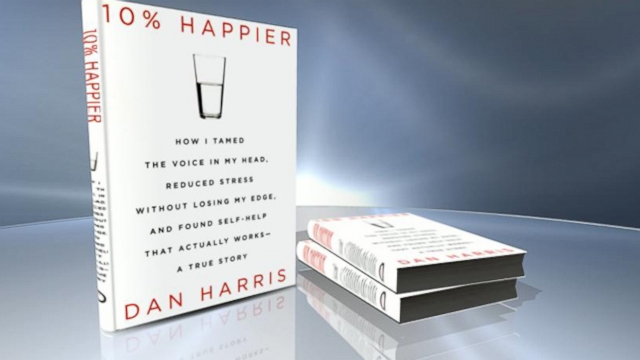Live for the moment!”
Sounds like a modern hedonist, doesn’t it?
Or maybe like an ancient Epicurean: “Let us eat and drink, for tomorrow we die!”
 Or perhaps even like a yogi (what do you call someone who does Yoga?).
Or perhaps even like a yogi (what do you call someone who does Yoga?).
A few months ago, I was reading 10% Happier: How I Tamed the Voice in My Head, Reduced Stress Without Losing My Edge, and Found Self-Help That Actually Works. In it, TV journalist Dan Harris (of Good Morning America fame) describes his sincere but often bizarre search for happiness that took him to many weird and wonderful people, places, and practices until he settled on a pretty extreme form of yoga-related meditation which made him, O, about 10% happier.
At the end of it you think, “Wow, all that effort for just 10% happier!” Yet, Harris still thinks it was worth it, especially learning the ability to live in the moment and for the moment. The idea, often called mindfulness, is to get to a state of mind that does not think backwards or forwards, that doesn’t remember the past or anticipate the future. Instead the mind is perfectly balanced in the here and now, and is achieved by emptying the mind of everything. If you think that’s easy, read the book, or, better, try it yourself. As Harris describes it, it’s like cage-fighting with a fish:
It was a rigorous brain exercise: rep after rep of trying to tame the runaway train of the mind. The repeated attempt to bring the compulsive thought machine to heel was like holding a live fish in your hands. Wrestling your mind to the ground, repeatedly hauling your attention back to the breath in the face of the inner onslaught required genuine grit.
Funny and Sad
While it’s both sad and funny to read about Harris’s harrowing and humorous journey to this all-too-brief cathartic experience, there’s something about this desire to live in the moment that is healthy, desirable, and all-too-absent from most Christians’ spiritual lives.
I know, I know, as Christians we don’t believe in peace through weird techniques aimed at emptying the mind of everything. We believe in peace through the filling of the mind with God’s truth and the filling of the soul with the Holy Spirit.
But, but, but…this book reveals a real human need, a God-given instinct that senses the value of inner and outer quiet as a means of knowing oneself and God.
Yes, the yogis go about it the wrong way, in a harmful and merely temporary way. But many of us would be in a much happier and healthier spiritual (and physical) state if we were better able to live in the moment in a Christian way. Like the yogis, Christians need to tame the voice in our head and learn to get in the Now.
Thought-Experiment
If you don’t think you need this, do this experiment: at various points in the day try to slow your mind down, to quieten your inner voice, and live in the moment:
- In bed, think only of the sweetness of sleep instead of regrets about the past day and plans for the next.
- In the shower, think only about each drop of refreshing and relaxing water, instead of your schedule and problems.
- At breakfast, think only about the food, savor each tasty mouthful of cornflakes, milk, bacon, and more bacon.
- In the car, turn the radio and phone off, and think about the gift of transport, mobility, and safety.
- In conversation, focus 100% on the person in front of you.
- In running or walking get rid of the iPod and just listen to the birds.
- In a meeting, just be fully present at the meeting.
- In Bible reading, concentrate only on the verse you are reading and nothing else.
- In church, only worship.
It’s radical isn’t it. Do only one thing at a time. Live in the moment. In the now. In Ecclesiastes 2:24-26.
When you start trying this, you’ll realize how hard it is to break the mental habits of a lifetime. The past and the future keep invading and capturing the present. The defaults are deep, and the old instincts so easily creep up on us again. But, as Harris, discovered to some extent, this can be learned, this mental and spiritual muscle can developed and strengthened through exercise. A muscle that helps you to stay still!
“Be still and know that I am God.”
That’s the bottom line. There is no real, life-changing knowledge of God without stillness.
If you read the book, you’ll notice many significant differences between transcendental and Christian meditation. And the biggest difference of all is that Christian stillness produces saving and sanctifying knowledge of God. And far more than 10% happier.
What’s worse?
I once met a Christian man who had become quite well-known for his vigorous public opposition to yoga and transcendental meditation. I’m with him 100% on that. But as I talked briefly with him and watched him interact (also briefly) with others, I thought to myself, “Wow, maybe a bit of yoga would do you some good!” I don’t think I’ve ever seen anyone so agitated, so distracted, so absent while present, so distant while so near. There wasn’t a relaxed fiber in his body and he was clearly on well-practiced robotic auto-pilot in conversation while his mind was many miles away.
I’m not sure that’s any healthier a spiritual state to be in than Nirvana.